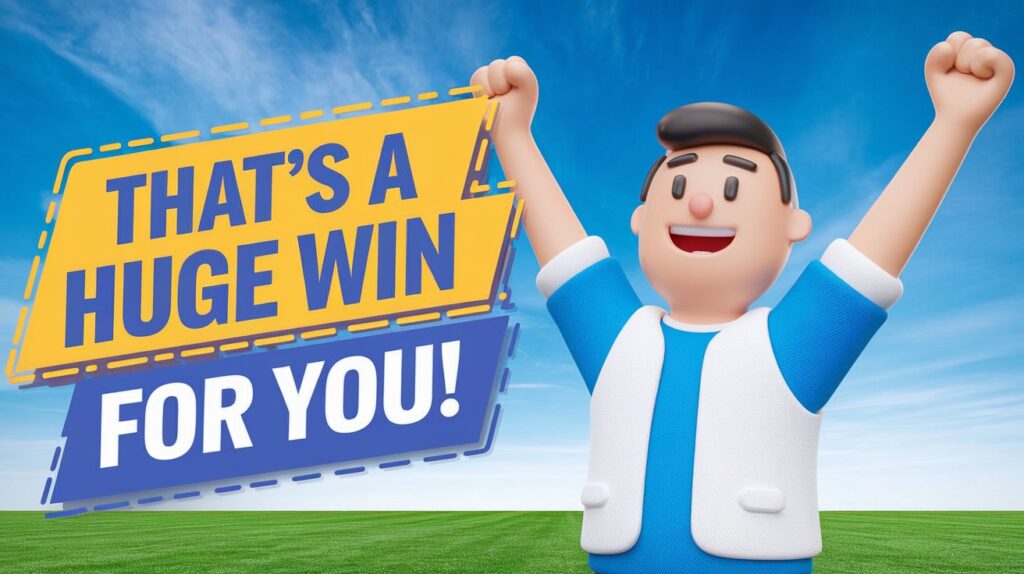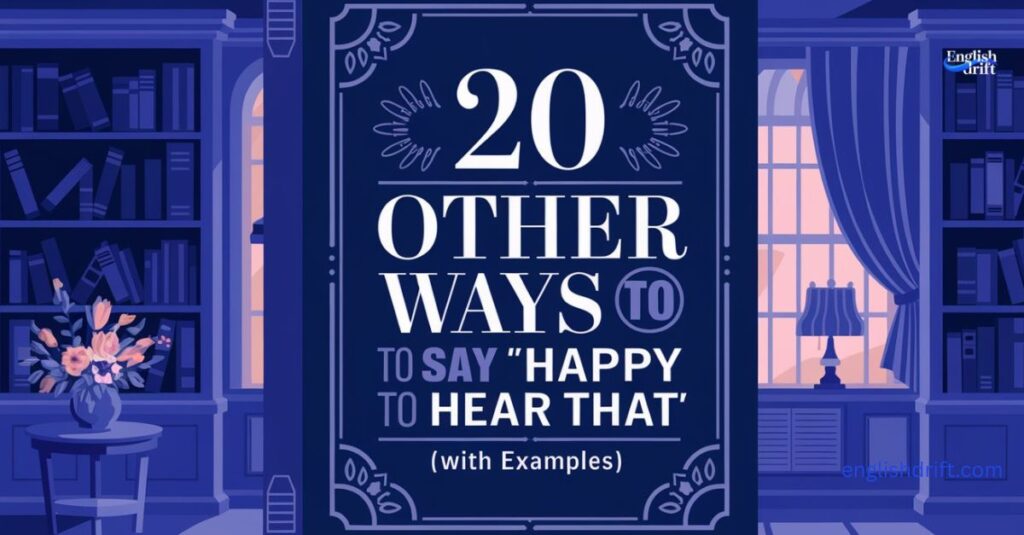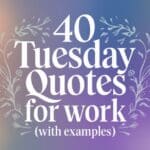The phrase “Happy to hear that” is a classic go-to when we want to express happiness in response to someone’s good news. Whether it’s personal or professional, the phrase is versatile and widely understood. But like any phrase we use repeatedly, it can start to feel a little stale over time. You want your words to carry sincerity and emotion, not just come across as a scripted response.
By using alternative phrases, you can keep your responses fresh, relevant, and personalized for different situations. Whether you’re chatting with a friend or writing a formal email, there are plenty of ways to express happiness that go beyond just saying “Happy to hear that.”
In this comprehensive post, we’ll walk through 20 alternatives to “Happy to hear that” and discuss when and how to use them effectively. We’ll also dive into why switching up your language is important, and how you can tailor your message to match the emotional weight of the news. Let’s start with why it’s useful to vary your responses in the first place.
Why “Happy to Hear That” Can Feel Overused
We live in a fast-paced world where people share exciting news every day—whether it’s about a promotion, a personal milestone, or a small success. Naturally, you want to congratulate them and acknowledge their achievement. The phrase “Happy to hear that” does the job, but when it’s used too often, it can start to sound generic. Why? Because it lacks personalization and depth.
Here’s why overusing “Happy to hear that” might not always work:
- Lack of Emotional Connection: Over time, saying the same phrase can sound more like a reflex than a genuine expression of happiness. It doesn’t necessarily reflect the emotion behind the news.
- Insincerity: People value sincerity, especially in personal interactions. When the same phrase is used in every context, it might start to feel disingenuous or impersonal.
- Context Matters: Different news calls for different reactions. Not every piece of good news has the same weight, and your responses should reflect that.
The Importance of Personalization
Personalizing your response can make all the difference. Instead of defaulting to “Happy to hear that,” try using a phrase that reflects the specificity of the news. Personalization shows that you’re engaged and that you’ve taken the time to truly process what’s being shared.
For example, if a friend shares that they’ve just bought their first home, a response like “That’s fantastic news! I know how hard you’ve worked for this” feels more thoughtful than a simple “Happy to hear that.”
Read More 20 Other Ways to Say “Happy Birthday in Advance” (with Examples)
When to Use Alternatives to “Happy to Hear That”
Tone and Setting
It’s essential to match the tone and setting of the conversation when you’re responding to good news. For example, if you’re responding to a professional email, a phrase like “I’m so glad to hear that” is appropriate, whereas “That just made my day!” might be better suited for a casual conversation with friends.
The Level of Excitement
Not all good news is created equal. If someone tells you that they’ve completed a major project at work, the response should differ from when they tell you they’ve had a nice lunch. In moments of high excitement, you may want to convey stronger emotions like “I’m thrilled to hear that!” whereas lighter news might call for a more subtle response, like “That’s wonderful to hear.”
Emotional Investment
If the news being shared involves a personal milestone or a heartfelt moment, it’s crucial to use a response that conveys emotional depth. For example, if a friend tells you they’re finally starting the family they’ve always dreamed of, you’d want to say something like “I couldn’t be happier for you” instead of a more neutral phrase.
Now, let’s dive into the 20 alternative phrases that you can use instead of “Happy to hear that.”
Read More 20 Other Ways to Say “Rest in Peace” (With Examples)
20 Other Ways to Say “Happy to Hear That”
- That’s fantastic news!
- I’m really pleased to hear that.
- Wow, that’s amazing!
- I’m genuinely thrilled for you.
- That just made my day!
- I’m overjoyed to hear that.
- That’s music to my ears!
- What a pleasant surprise!
- That’s exactly what I wanted to hear.
- I couldn’t be happier for you.
- That news just brightened my day.
- That’s wonderful to hear.
- I’m ecstatic about that!
- I’m so happy for you!
- That’s such fantastic news!
- That brings me so much joy.
- I’m really excited to hear that.
- What an incredible milestone!
- I’m deeply moved by that.
- That’s a huge win for you!
20 Alternatives to “Happy to Hear That” (With Examples)
1. That’s fantastic news!
This phrase is filled with enthusiasm and works best when responding to something truly exciting. It’s perfect for major accomplishments or announcements, such as getting a job offer, passing a major exam, or reaching a life milestone.
Example:
“That’s fantastic news! I’ve been rooting for you since day one, and I’m so happy to see everything come together for you!”
2. I’m really pleased to hear that.
A more formal alternative, this phrase is ideal for professional settings. It conveys your positive feelings in a polite and professional manner without being overly emotional.
Example:
“I’m really pleased to hear that the project is moving forward smoothly. You’ve done excellent work.”
3. Wow, that’s amazing!
This phrase captures the element of surprise and admiration, making it a great choice when the news is truly impressive or remarkable.
Read More 20 Other Ways To Say “Please Disregard My Previous Email” (With Examples)
Example:
“Wow, that’s amazing! I knew you were capable, but this really exceeds all expectations!”
4. I’m genuinely thrilled for you.
Adding the word “genuinely” emphasizes that your excitement is real and heartfelt. This phrase is perfect for moments when you’re truly happy for someone’s success.
Example:
“I’m genuinely thrilled for you. I know how much this means to you, and I couldn’t be more excited!”

5. That just made my day!
A fun and casual phrase, this one shows that the person’s news has had a positive impact on you. It’s especially useful for lighter moments or everyday conversations where the news brings a sense of joy or relief.
Example:
“That just made my day! I’ve been waiting to hear some good news, and this is exactly what I needed!”
6. I’m overjoyed to hear that.
This is a more formal and heartfelt way to express happiness, especially when the news is personal or deeply meaningful.
Example:
“I’m overjoyed to hear that you’re doing well. You’ve been through so much, and it’s wonderful to see things improving.”
7. That’s music to my ears!
This phrase is great for moments when the news brings relief or joy, particularly in situations where the outcome was uncertain. It adds a touch of whimsy while conveying happiness.
Read More 20 Other Ways to Say “Happy Easter” (With Examples)
Example:
“That’s music to my ears! I’ve been anxious about this, and hearing that everything went well is such a relief.”
8. What a pleasant surprise!
This phrase works well when the news is both unexpected and welcome. It conveys genuine happiness without going over the top.
Example:
“What a pleasant surprise! I wasn’t expecting such good news today, but I’m thrilled to hear it.”

9. That’s exactly what I wanted to hear.
If you’ve been hoping for a specific outcome, this phrase shows that the news aligns perfectly with your expectations. It’s a direct way to express satisfaction.
Example:
“That’s exactly what I wanted to hear! I’ve been rooting for you and had a feeling things would turn out great.”
10. I couldn’t be happier for you.
This phrase is ideal for celebrating someone else’s success, showing that their good news brings you immense joy as well. It’s perfect for personal achievements like promotions, weddings, or graduations.
Example:
“I couldn’t be happier for you. You’ve worked so hard to get here, and it’s so well-deserved!”
11. That news just brightened my day.
Here’s a friendly, feel-good phrase that communicates how the news has positively impacted your mood.
Example:
“That news just brightened my day! I was feeling a bit down, and this has really lifted my spirits.”
12. That’s wonderful to hear.
This simple yet elegant phrase works well in both formal and casual settings. It strikes the perfect balance between genuine happiness and professionalism.
Example:
“That’s wonderful to hear! I’m so glad everything is going well for you.”
13. I’m ecstatic about that!
This phrase is best reserved for moments of major excitement, where the news is truly a cause for celebration.
Example:
“I’m ecstatic about that! This is such an exciting development, and I can’t wait to see where it takes you.”
Read More 20 Other Ways to Say “Nice to See You Again” (With Examples)
14. I’m so happy for you!
This is a classic phrase that expresses joy for someone else’s success or good fortune. It’s simple, sincere, and widely applicable.
Example:
“I’m so happy for you! You’ve been working toward this for so long, and it’s incredible to see it finally happening.”
15. That’s such fantastic news!
Use this phrase when the news is particularly significant or life-changing. It carries a tone of both excitement and admiration.
Example:
“That’s such fantastic news! I know how much this means to you, and I couldn’t be more excited for what comes next.”

16. That brings me so much joy.
For heartfelt moments, this phrase emphasizes how deeply the news resonates with you.
Example:
“That brings me so much joy. It’s been a long journey for you, and I’m so glad to see you at this point.”
17. **I’m really excited to hear that
.**
This phrase is great for professional or formal settings where you want to express enthusiasm without being too emotional.
Example:
“I’m really excited to hear that the project is moving forward. Your hard work is definitely paying off!”
18. What an incredible milestone!
For big achievements, this phrase shows admiration and respect for the person’s hard work.
Example:
“What an incredible milestone! You should be really proud of everything you’ve accomplished so far.”
19. I’m deeply moved by that.
If someone shares personal or emotional news, this phrase conveys both happiness and empathy, showing that you’re genuinely affected by what they’ve shared.
Example:
“I’m deeply moved by that. It’s clear how much this means to you, and I’m honored to be part of this moment.”
20. That’s a huge win for you!
Use this when someone has achieved a personal or professional victory. It shows excitement and acknowledges the effort they’ve put into their success.
Example:
“That’s a huge win for you! You’ve worked so hard, and I’m so proud of everything you’ve done to get here.”
Here’s a table that categorizes the 20 alternatives to “Happy to hear that” based on tone (formal or casual) and emotional intensity (low, medium, or high). This will help you choose the right phrase for different contexts.

Table
| Phrase | Tone | Emotional Intensity | Best Context |
|---|---|---|---|
| That’s fantastic news! | Casual | High | Major personal or professional achievements |
| I’m really pleased to hear that. | Formal | Low | Professional settings or formal conversations |
| Wow, that’s amazing! | Casual | High | Exciting, impressive news |
| I’m genuinely thrilled for you. | Formal | High | Personal or meaningful milestones |
| That just made my day! | Casual | Medium | Everyday good news that brings joy |
| I’m overjoyed to hear that. | Formal | High | Heartfelt moments or significant emotional news |
| That’s music to my ears! | Casual | Medium | Relieving or uplifting news |
| What a pleasant surprise! | Casual | Medium | Unexpected good news |
| That’s exactly what I wanted to hear. | Casual | Low | When the outcome matches your expectations |
| I couldn’t be happier for you. | Casual | High | Celebrating someone’s major life event or success |
| That news just brightened my day. | Casual | Low | Light-hearted, everyday good news |
| That’s wonderful to hear. | Formal | Medium | Professional or casual settings |
| I’m ecstatic about that! | Casual | High | Big, exciting personal or professional news |
| I’m so happy for you! | Casual | Medium | Simple, heartfelt congratulations |
| That’s such fantastic news! | Formal | High | Significant milestones or life-changing events |
| That brings me so much joy. | Casual | High | Personal, emotionally meaningful news |
| I’m really excited to hear that. | Formal | Medium | Positive professional news or work-related updates |
| What an incredible milestone! | Formal | High | Celebrating major achievements |
| I’m deeply moved by that. | Formal | High | Personal, emotional news that resonates |
| That’s a huge win for you! | Casual | Medium | Successes in work or personal victories |
When to Use These Phrases
Now that you have a variety of alternatives to “Happy to hear that,” it’s important to know when and where to use them. Let’s break it down into some common scenarios:
1. Professional Settings
In professional communications, you want to strike a balance between warmth and formality. Phrases like “I’m really pleased to hear that” or “That’s fantastic news!” work well in emails, team meetings, or work-related messages. They show you care while maintaining a professional tone.
2. Personal Conversations
With friends, family, or casual acquaintances, you have more flexibility to be expressive. Phrases like “That just made my day” or “I couldn’t be happier for you” add a personal touch and show that you’re emotionally invested in their success.
3. Milestones and Major Achievements
Big life events—like promotions, graduations, weddings, or the birth of a child—deserve more significant recognition. Using phrases such as “I’m ecstatic about that!” or “What an incredible milestone!” shows that you understand the importance of the news and are celebrating alongside the person.
4. Everyday Wins
Not every piece of good news will be life-changing, but it’s still worth celebrating the little victories. For everyday achievements, try phrases like “That’s wonderful to hear” or “That’s a huge win for you!”
Conclusion
Incorporating alternatives to “Happy to hear that” keeps your conversations vibrant and sincere. Whether you’re writing a formal email or chatting with a friend, using personalized and varied responses strengthens connections and adds emotional depth to your interactions.
The next time you receive good news, try one of these 20 alternatives to convey your excitement or appreciation in a more thoughtful, memorable way. Personalizing your response makes all the difference, and it shows that you truly care.

Henry James is an experienced blogger at English Drift, specializing in English grammar and vocabulary. With a passion for language and clear communication, Henry helps readers enhance their writing skills through insightful guides and practical tips.







